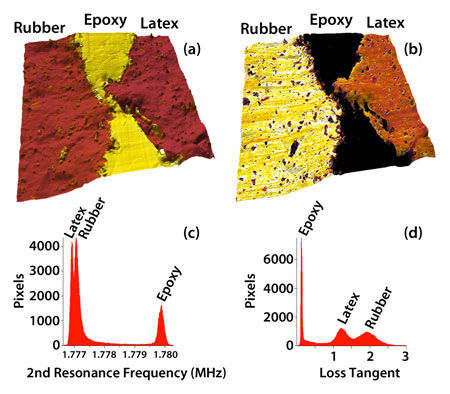| Apr 26, 2012 |
Free webinar: Opportunities, Challenges, and Frontiers of Nanomechanical Measurements with AFM
|
|
(Nanowerk News) Asylum Research, the technology leader in scanning probe and atomic force microscopy (SPM/AFM), will present Part 1 of three nanomechanics webinars on May 23.
|
|
This first webinar, entitled "Introduction and Innovations in High Speed Quantitative Nanomechanical Imaging," will begin with a survey of the mechanical properties that can be investigated with the wide array of available nanoscale property mapping techniques. We will then introduce two new techniques that allow unambiguous interpretation of material nanomechanical properties: AM-FM and Loss Tangent. Amplitude-modulated (AM) atomic force microscopy, also known as tapping mode, is a proven, reliable and gentle imaging method with wide spread applications. Previously, the contrast in tapping mode has been difficult to quantify. The new AM-FM imaging technique combines the features and benefits of normal tapping mode with the quantitative, high sensitivity of Frequency Modulation (FM) mode. Loss Tangent imaging is another recently introduced quantitative technique that recasts the interpretation of phase imaging into one term that includes both the dissipated and stored energy of the tip sample interaction. These techniques allow high speed, low force imaging in tapping mode while providing quantitative Elasticity and Loss Tangent images.
|
 |
| (a) AM-FM image (b) Loss Tangent image and (c) AM-FM histogram and (d) Loss Tangent histogram of a cryotomed latex/epoxy/rubber gum polymer sandwich. The AM-FM stiffness map clearly resolves the small elastic difference between the latex and rubber gum. The Loss Tangent difference is even more distinct.
|
|
Said presenter and Asylum Research President Dr. Roger Proksch, "Nanoscale mechanical properties cover a breathtaking range of values. For example, the elastic modulus of common materials can range well over five or six orders of magnitude. The same can be said of the loss modulus of materials, with metal, glasses, and ceramics with low dissipation often behaving like ideal elastic solids, while many elastomers behave almost like liquids. A single nanomechanical technique – such as a force curve – is simply insufficient for accurately revealing sample properties and can often yield misleading and even inaccurate conclusions. Put simply, if all you have is a hammer, then all of your problems start to look like nails. During the course of this webinar series we will be looking at the wide range of techniques available to the researcher to cover the wide range of properties with which nature challenges us. A primary goal of this seminar series is to provide researchers with a solid overview of nanomechanical measurements, enabling them to critically interpret these measurements, and to provide a solid foundation for their future research."
|
|
About Asylum Research
|
|
Asylum Research is the technology leader in atomic force and scanning probe microscopy (AFM/SPM) for both materials and bioscience applications. Founded in 1999, we are an employee owned company dedicated to innovative instrumentation for nanoscience and nanotechnology, with over 300 years combined AFM/SPM experience among our staff. Our instruments are used for a variety of nanoscience applications in material science, physics, polymers, chemistry, biomaterials, and bioscience, including single molecule mechanical experiments on DNA, protein unfolding and polymer elasticity, as well as force measurements for biomaterials, chemical sensing, polymers, colloidal forces, adhesion, and more. Asylum's product line offers imaging and measurement capabilities for a wide range of samples, including advanced techniques such as electrical characterization (CAFM, SKPM, EFM), high voltage piezoresponse force microscopy (PFM), thermal analysis, quantitative nanoindenting, and a wide range of environmental accessories and application-ready modules.
Asylum's MFP-3D set the standard for AFM technology, with unprecedented precision and flexibility. The MFP-3D is the first AFM with true independent piezo positioning in all three axes, combined with low noise closed-loop feedback sensor technology. The MFP-3D offers both top and bottom sample viewing and easy integration with most commercially-available inverted optical microscopes.
|
|
Asylum's Cypher AFM sets the new standard as the world's fastest and highest resolution AFM. Cypher provides low-drift closed loop atomic resolution for the most accurate images and measurements possible today, >20X faster AC imaging for images in minutes instead of minutes or hours, Spot-On™ automated laser and photodetector alignment for easy setup, integrated thermal, acoustic and vibration control, and broad support for all major AFM/SPM scanning modes and capabilities.
|
|
Asylum Research offers the lowest cost of ownership of any AFM company. Ask us about our industry-best 2-year warranty, our legendary product and applications support, and our exclusive 6-month money-back satisfaction guarantee. We are dedicated to providing the most technically advanced AFMs for researchers who want to take their experiments to the next level. Asylum Research also distributes third party cantilevers from Olympus, Nanoworld/Nanosensors, and our own MFM and iDrive™ tips.
|

